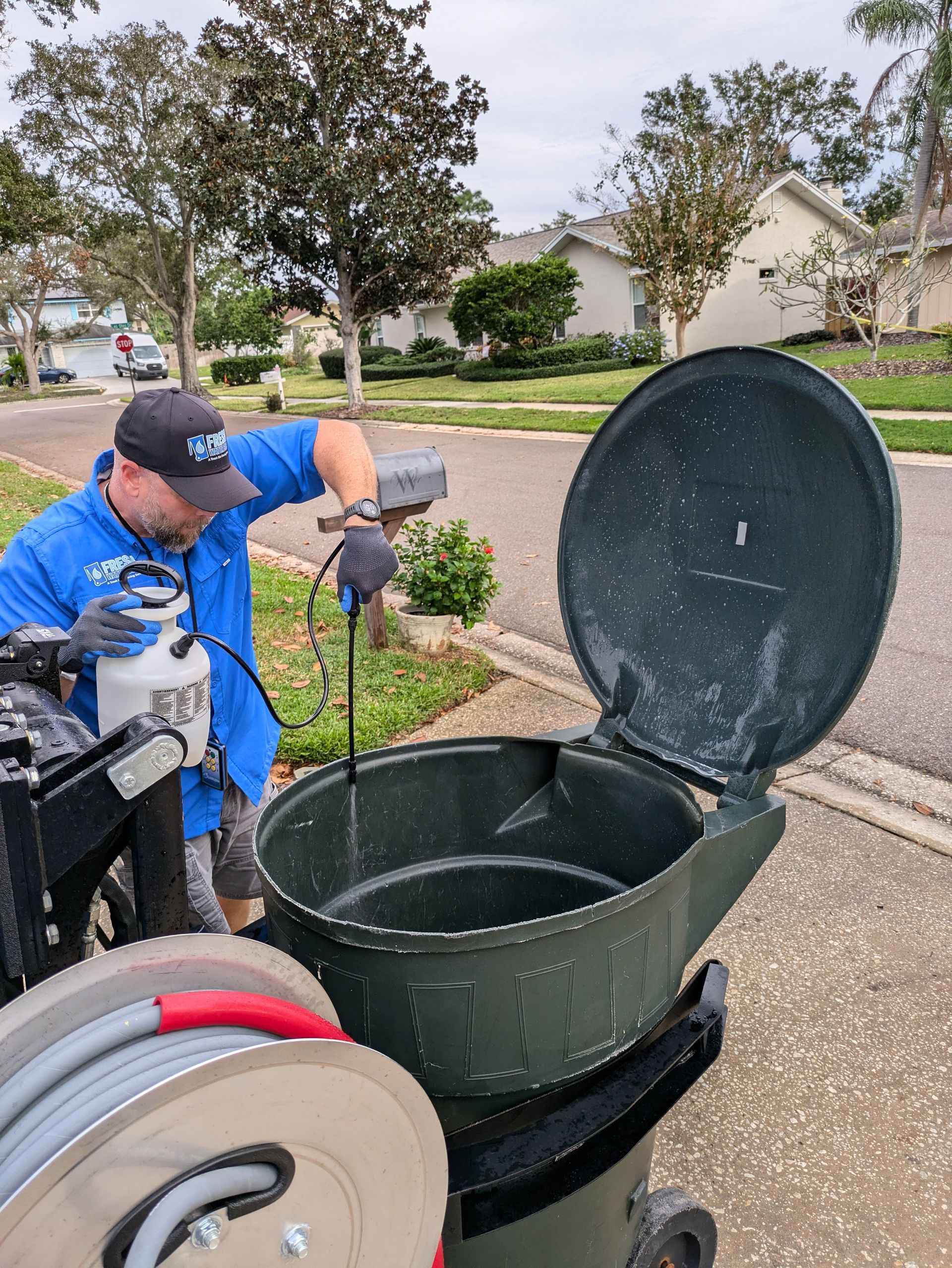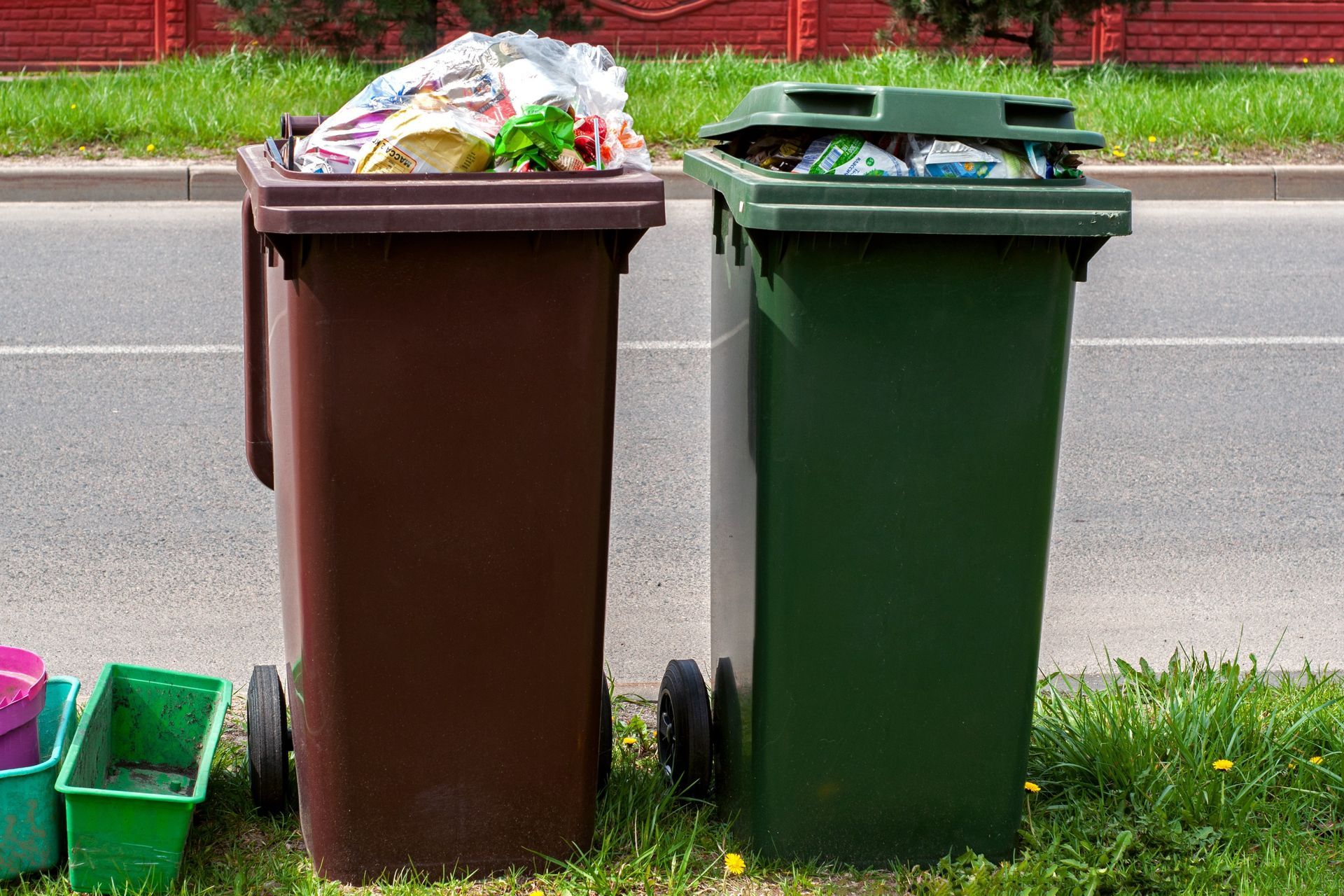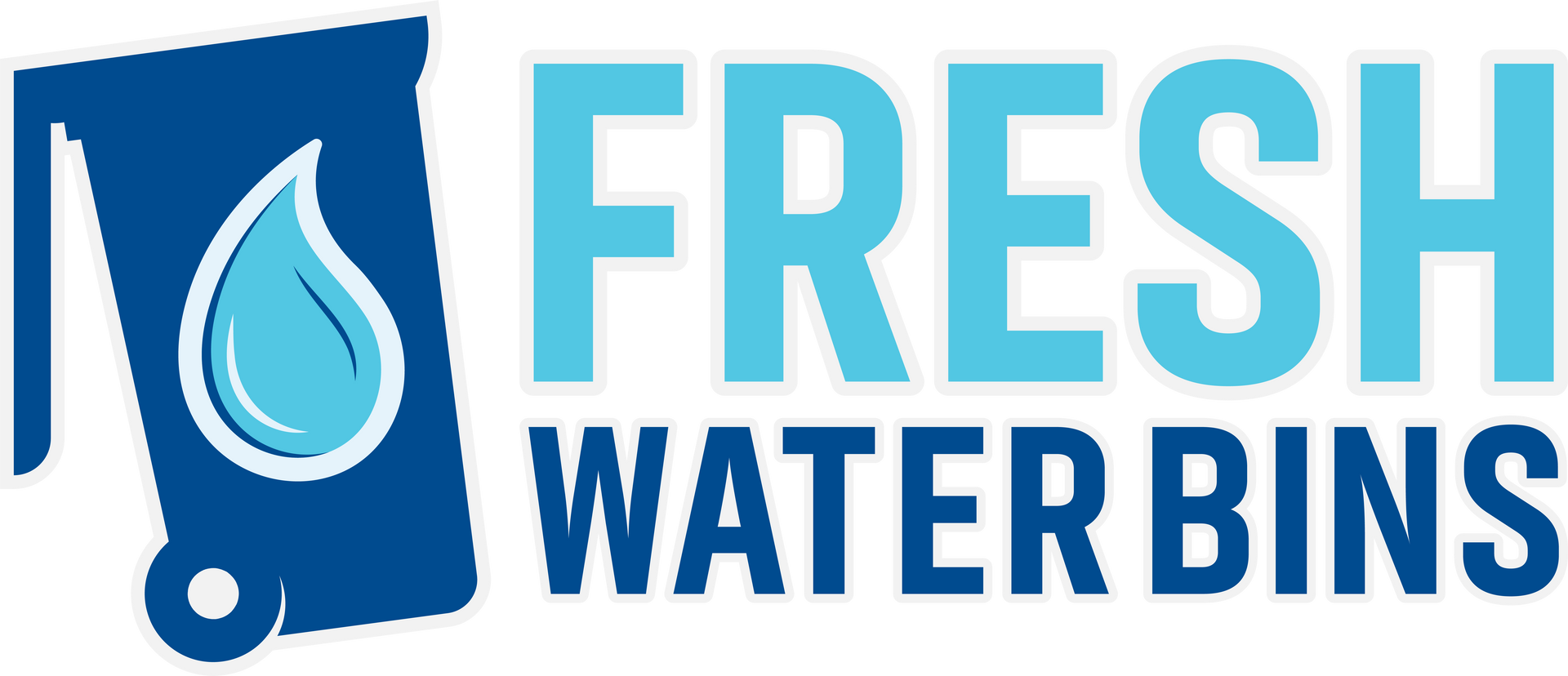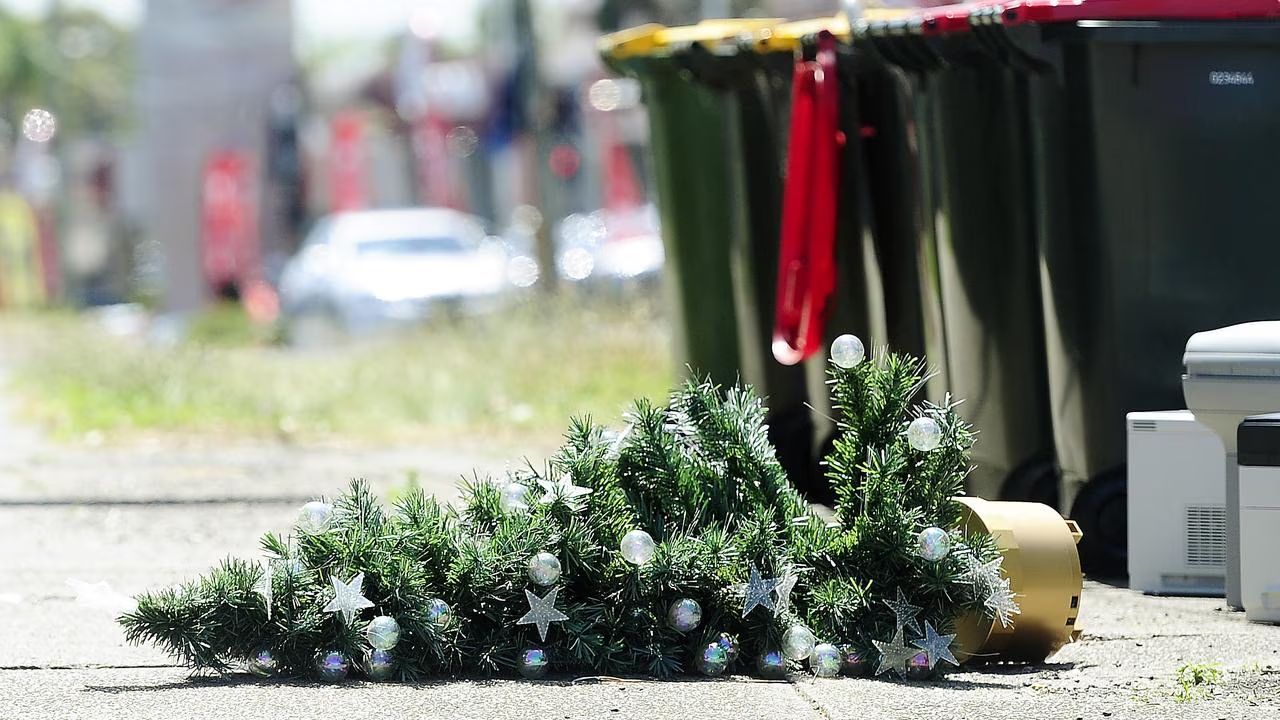Trash Bin Cleaning: DIY to Professional
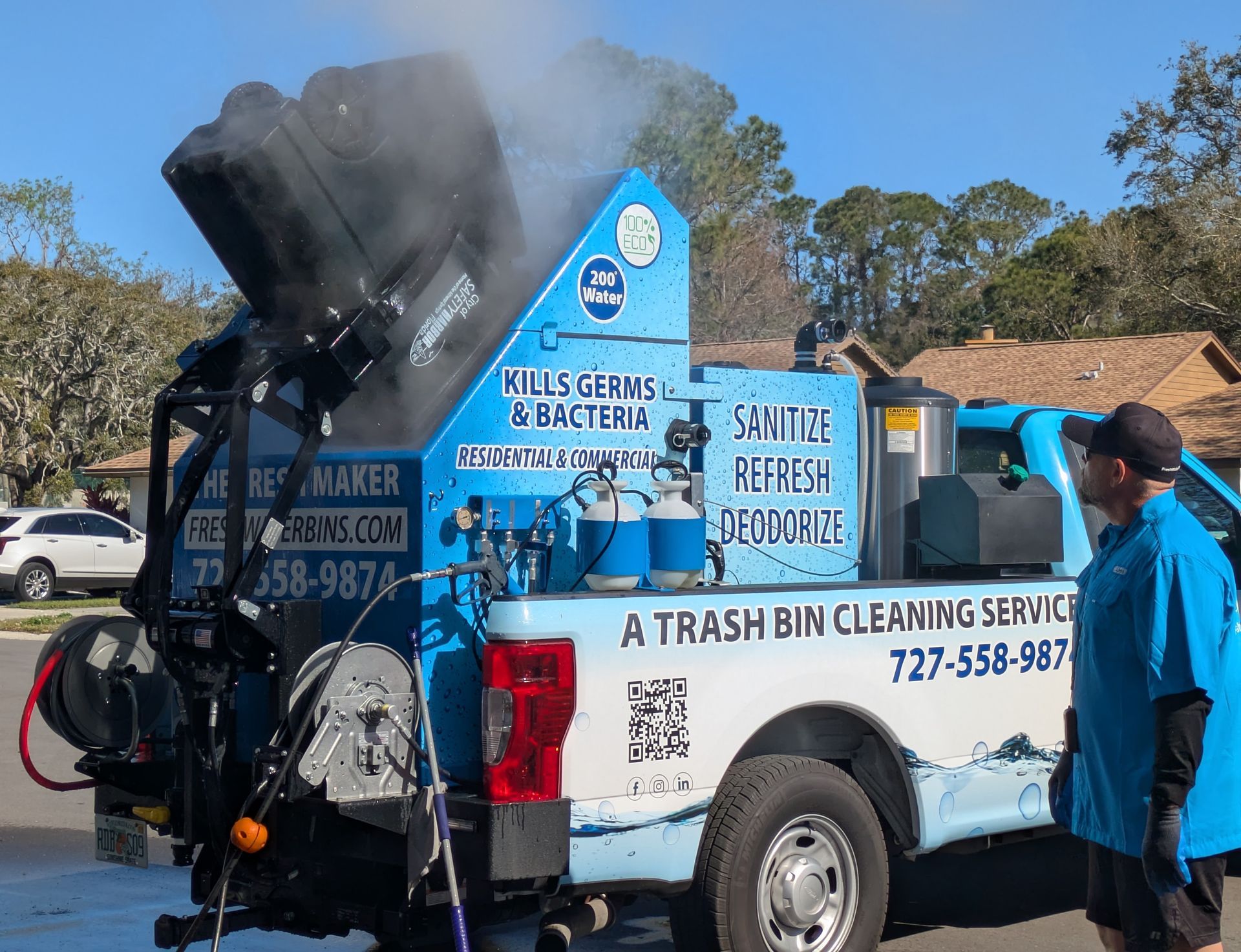
The DIY Era
In the past, cleaning your trash bins was a hands-on, labor-intensive task relegated to homeowners and businesses.
Manual Labor: DIY bin cleaning requires individuals to scrub, hose down, and disinfect their bins manually. It was time-consuming and often unpleasant. Not to mention the splash back…Gross!
Limited Equipment: Most DIYers hopefully had essential equipment like a hose, bucket, and cleaning agents. These tools were effective but couldn’t provide the deep cleaning, sanitization, and odor control that modern methods offer. Homeowners that live in townhomes or attached buildings may not even have access to an outside water hose.
Sustainability Ignored: Environmental concerns weren’t a top priority during this DIY time. Commercial cleaners often contain harsh chemicals and water usage wasn’t optimized. Using these toxic chemicals can not only damage your bin, but also dangerous substances and wastewater may travel through our storm drains to pollute our rivers and streams.
Just like you can wash your car yourself or go through a quick carwash, you can still clean your bin yourself, but why would you want to?!
If you proceed with the DIY option, remember to never mix bleach with soap, vinegar or other cleaners, as this could create a potentially lethal gas!!!!
The Rise of Professional Trash Bin Cleaning Services
Starting in Europe, the demand for a cleaner and more hygienic trash bin paved the way for professional services to emerge.
Specialized Equipment: Trash bin cleaning professionals, like Fresh Water Bins use super-heated water, specialized high-pressure washing systems, eco-friendly cleaning agents, and purpose-built vehicles designed for efficient bin cleaning.
Eco-Friendly Practices: Many professional services prioritize the environment by using biodegradable cleaning agents, high-pressure water, steam, responsible waste disposal, and water-saving techniques.
Thoroughness: Professional cleaners can provide cleanliness and odor control that’s challenging to achieve with DIY methods. We reach every nook and cranny, ensuring bins are not only clean but also sanitized. And here at Fresh Water Bins, we finish our bins with citrus oil that smells wonderful!
Convenience: Professional services offer convenience, allowing customers to schedule cleanings at their convenience. This eliminates the need for DIY bin cleaning and frees up valuable time. Regular cleaning prevents odors, pests and buildup of grime.
Health and Safety: By entrusting professionals such as Fresh Water Bins, customers reduce the risk of exposure to harmful bacteria and pests that may thrive in bins. Remember clean is good, but sanitized is better.
The Future of Trash Bin Cleaning:
So, as we bid farewell to the days of DIY and bleach, let’s welcome the future of trash bin cleaning with open arms - a future that’s cleaner and greener! Call Fresh Water Bins at 727-558-9874 to get your bins professionally cleaned today!
How Often Should You Clean Your Trash Bins?
Trash bins are essential for managing waste but can quickly become a breeding ground for bacteria and unpleasant odors. Regular bin cleaning is crucial, but how often should you clean your trash bins?
The Impact of Dirty Bins
Neglecting your trash bins can have several undesirable outcomes. Residual food, liquids, and waste buildup can let harmful bacteria and pests thrive. The result? Foul odors, potential health hazards, and an unsightly mess in your immediate surroundings. Here at Fresh Water Bins, we want you to stay healthy and happy.
Cleaning Frequency
Usage: The frequency of cleaning largely depends on how often you use your bins. More frequent cleaning may be necessary for households with daily waste disposal compared to bins used less frequently.
Seasonal Differences or Local Climate: In warmer months, bacteria and odors reproduce faster. Therefore, you may need to clean your bins more often during the summer. High humidity and rainfall can accelerate bacterial growth and odor development. Residents in humid regions may need to clean their bins more frequently. Living in Florida, you already know these factors are a everyday norm.
Type of Waste: Bins containing food waste or other items can leak fluids that may require more frequent cleaning to prevent bacterial growth and odors. Have pets or babies in diapers? Remnants of fishing trips? I don’t need to tell you how terrible the stench can get.
Recommended Cleaning Schedule
While cleaning frequencies can vary based on the factors previously mentioned, a good rule of thumb:
Residential Bins: Aim to clean your residential trash bins once a month or at least quarterly.
Commercial Bins: Businesses generating substantial waste should clean their bins monthly to ensure a sanitary environment and comply with health regulations.
DIY vs. Professional Bin Cleaning
You can clean your bins, but professional bin cleaning services such as Fresh Water Bins offer several advantages. We use specialized equipment and eco-friendly cleaning agents to ensure a thorough and sanitized cleaning process. Moreover, our professional services save you time, energy, and effort.
Finding the Right Frequency for Bin Cleaning
The frequency of cleaning your trash bins should be considered for maintaining a clean and healthy environment. Neglecting bin cleaning can lead to health risks, foul odors, and unsightly surroundings. By following a recommended cleaning schedule, you can enjoy the benefits of a fresher, safer space.
Ready to take on those filthy trash bins? Call Fresh Water Bins at 727-558-9874 for a free quote today!
Fun Facts:
Placing your bin in a shady spot can help reduce odors. The heat from the sun can make smells worse. Keeping it cool can keep your bin fresher for longer.
Americans throw out an average of 4.9 pounds of trash per person daily and is enough trash to circle the earth 24 times a year.
A dirty trash bin is 1000 times more contaminated with bacteria than your toilet seat and handle! A 2011-2012 study of acute care hospitals found over 10,000 distinctive microorganisms in trash bins and dumpsters.
Studies have found on average that millions of bacteria are found per square inch in a trash bin. A breeding ground for bacteria such as E. coli, Listeria, and Salmonella.
Dirty bins can affect the air quality around your home and have an impact on your overall health.
Keeping your bin lid closed helps keep out rainwater and other pests. Trash feeds populations of pests like cockroaches and rats, which can damage property, deteriorate housing, contaminate food, and transmit disease.
Using high pressure hot water allows us to clean your bin by using 50% less water than a typical homeowner doing a manual cleaning by themselves at home
